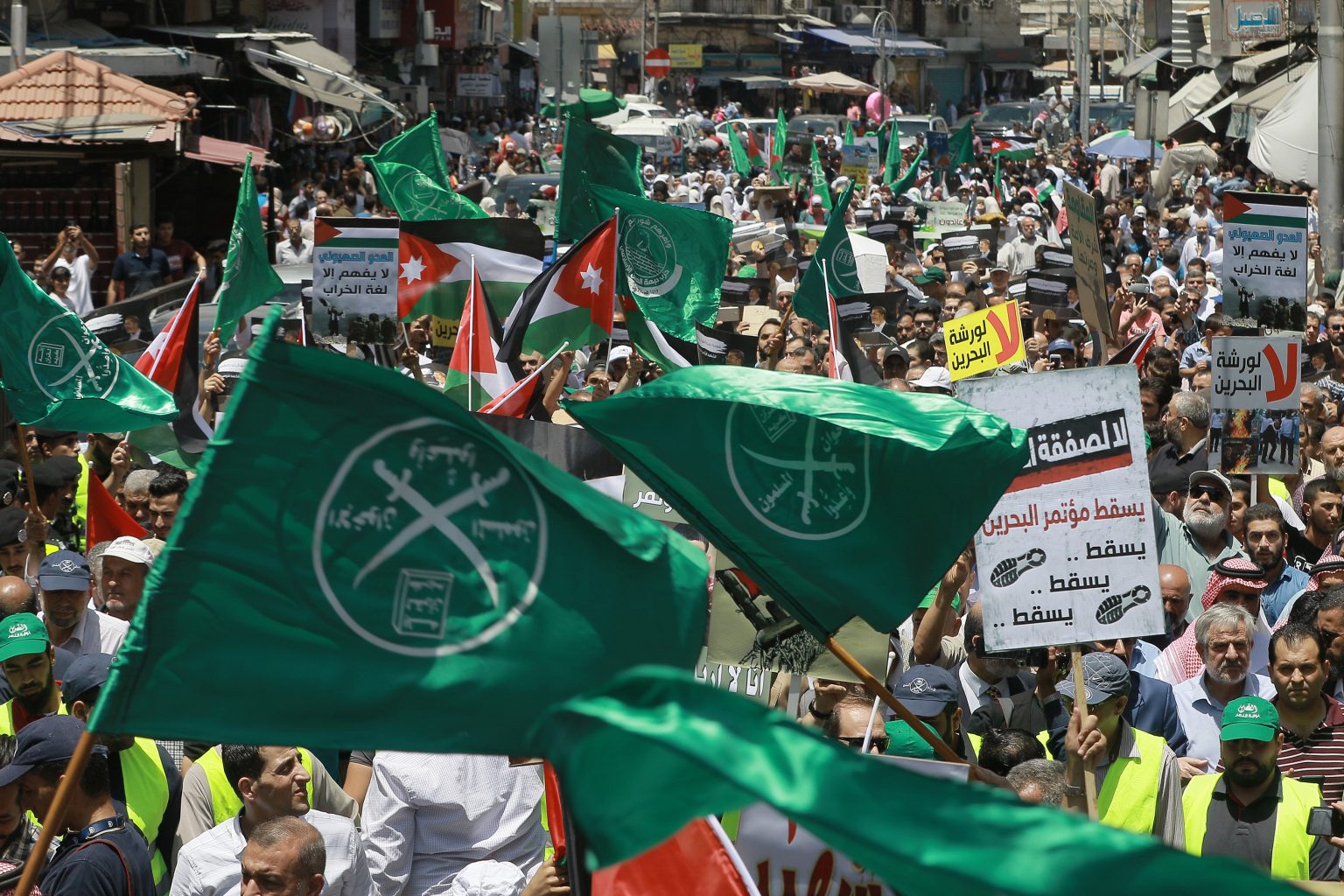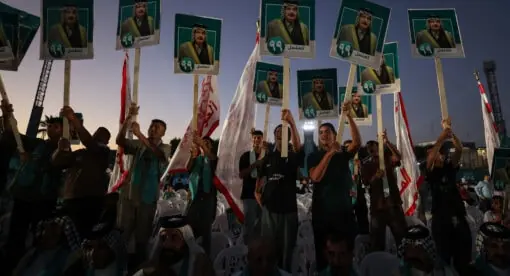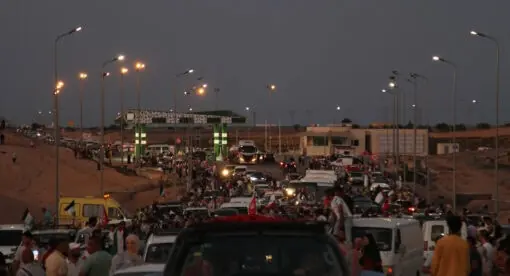The July 16 decision of Jordan’s top court to officially dissolve the Muslim Brotherhood was a huge blow to the Islamist organization, which had been legally operating in the kingdom for 75 years. Amman’s move to end its historic accommodationist attitude toward the group could spark violence in Jordan, one of the few states in the region not plagued by unrest and war. Such a backlash could amplify its already precarious position as a weak state caught between several different conflict zones.
The Brotherhood has been based in the Qatari capital of Doha, but it has thrived in Jordan. The movement is represented throughout society and even within the civil service, albeit unofficially. Amman’s about-face suggests it is confident that it will not face any backlash, and currently, the group is in the process of absorbing the blow and challenging the court’s decision. But that civility could change if the government refuses to budge.
Jordan’s decision to dismantle the Brotherhood comes at a particularly challenging time for 58-year old King Abdullah II, as fears grow of an eventual Israeli annexation of around 30% of the West Bank (including the Jordan Valley), which was slated for July 1. If that annexation does happen between now and the November U.S. presidential election, it might trigger violence among Jordan’s Palestinian population, who number 2.1 million out of the kingdom’s 9.9 million people, and many of whom are suffering economically and are affiliated with Hamas, the Gaza-based branch of the Brotherhood. The group is popular at a grassroots level and is capable of triggering public unrest in the kingdom if it feels that its members are being cornered into an impossible position, should the ban be final.
The West Bank annexation also could trigger a new wave of Palestinian refugees coming to Jordan, further straining the country’s already thin resources. The last thing Jordan needs is domestic turmoil or arms showing up in Palestinian camps.
Historical Ties
Before the court decision, the Muslim Brotherhood had been eyeing Amman as an alternative base of operations for its future activities in the event that rising tensions between Qatar and Saudi Arabia led to the group’s eviction. The two Gulf states have been at daggers-end since early summer 2017, when Riyadh led an Arab boycott of its tiny neighbor, demanding, among other things, that Doha sever ties with the Brotherhood.
In that context, the group held its third annual conference in the Dead Sea in December 2019, under the patronage of former Jordanian Prime Minister Abdelraouf Rawabdeh. Its members took turns at the podium, showering King Abdullah with praise, hoping to score points with Jordanian officialdom. They were expecting a rapprochement after a souring of relations in recent years, not a court verdict outlawing their activity.
The Brotherhood’s relationship with the Jordanian monarchy dates back to the kingdom’s founder, King Abdullah I, great-grandfather of the present monarch. Himself a pious Muslim, Abdullah I famously attended the group’s 1945 inauguration in Amman. Impressed by their goals of Islamic unity, he reportedly said, “If these are your goals, then count me as a member.” The Brotherhood stood by his grandson, King Hussein, when army generals tried to stage a coup against him in 1957, and then again during his 1970 showdown with Palestinian leader Yasser Arafat.
When members of the Syrian and Egyptian Brotherhood fled their countries in the 1960s and 1980s, many were given asylum in Amman. Jordanian members of the group took part in legislative elections and even secured the speakership of the house in the 1990s. In 1992, they founded a political party called Jabhat al-Amal al-Islami, or the Islamic Action Front.
Relations began to deteriorate with the outbreak of the Arab Spring in 2011. Jordanian members of the Muslim Brotherhood were undoubtedly inspired by the victory of their comrades in Egypt and the successes of their allies in Libya and Tunisia. In January 2013, their leader, Hammam Said, described Jordan as a “state in the Muslim caliphate.” That caliphate could not be established, however, before the toppling of the regimes in Cairo and Damascus — which is also an objective of jihadist groups.
That raised the ire of Abdullah, who three months later described the Muslim Brotherhood as “wolves in sheep’s clothing” in an interview with The Atlantic. In November 2014, Jordanian intelligence broke up a secret cell of the Brotherhood that had been smuggling arms to their comrades in the West Bank. The kingdom’s General Intelligence Directorate believes the Brotherhood wants to create a military branch for their activities within the country. Two months later, the king met with a delegation from the group, ordering them to distance themselves from the Egyptian Muslim Brotherhood.
Abdullah had no choice but to take a tough position. His demand fits with the stances of Saudi Arabia and the United Arab Emirates, which regard the Muslim Brotherhood, Turkey, Qatar, and Iran as existential threats to peace and security in the Arab world. Jordan, which is firmly allied with Riyadh and Abu Dhabi and has historically relied on them to settle its bills, could simply not afford to continue tolerating the Brotherhood’s activities in Jordan, no matter how it actually feels about the group. Many believed that Abdullah demanded the Jordanian Muslim Brotherhood separate itself from the Egyptian branch because of the danger the group posed, not to Jordan but rather to Saudi Arabia and the United Arab Emirates.
After Abdullah’s order, the group split in two: The Muslim Brotherhood Society pledged full allegiance to Jordan, while the original Muslim Brotherhood remained affiliated with the group’s Egyptian branch and was subsequently outlawed, and its members were imprisoned.
The legal pretext for dissolving the Muslim Brotherhood in Jordan was that it failed to “rectify their legal status under Jordanian law.” The group’s spokesman, Moaz al-Khawaldeh, said that the Brotherhood planned to appeal the court decision, saying it will not “melt away because of an administrative ruling.” He then added, “We are not outlaws.” The decision to keep the matter in courts and not to take to the streets of Jordan keeps a window open for a possible rapprochement.
Regional Struggles for the Brotherhood
The Muslim Brotherhood has been watching events unfold in the region with great concern. After much jubilation at early Islamist victories in 2011 and 2012, the tables began to turn with the ouster of Egyptian President Mohammad Morsi, followed by the toppling of Sudanese President Omar al-Bashir in 2019. Bashir had used the local branch of the Brotherhood to come to power in 1989 and throughout the 1990s, and he had offered sanctuary to a variety of Islamist figures, most notably, Osama Bin Laden.
With both Morsi and Bashir out of power, the group’s only remaining patrons were Qatari Emir Tamim bin Hamad Al Thani and Turkish President Recep Tayyip Erdogan. Everywhere else they were regarded as outlaws, from Syria and Egypt to Saudi Arabia and the United Arab Emirates. Erdogan’s ruling Justice and Development Party was rooted in the Brotherhood ideology, and he has made no secret of his admiration for the Brotherhood, supporting its regime in Cairo and making a strong effort to help bring the group to power in Syria.
In Syria, the Brotherhood is strongly represented in the northwestern city of Idlib and is affiliated with at least one of the powerful fighting groups, the Sham Legion. The group had helped Turkey occupy Jarablus and its environs in 2016 and then marched onto Afrin in 2018 before being shipped off to the Libyan battlefield in late 2019. Despite that connection, Erdogan had to drop the Brotherhood from the Syrian peace process that started in Geneva in November 2019, failing to bring any of its members onboard the constitutional committee, seemingly at the request of Russian President Vladimir Putin.
In November 2019, The Wall Street Journal reported that Qatar was offering to disengage from the Brotherhood after Foreign Minister Sheikh Mohammad Bin Abdulrahman al-Thani paid a secret visit to Riyadh. Qatar’s enmity with Saudi Arabia works for the Brotherhood, which has relied on Doha for sanctuary and political cover and often has used the studios of Al-Jazeera TV to disseminate its propaganda to Arab audiences. The Brotherhood is only one of many issues currently on the list of disagreements between Saudi Arabia and Qatar, and curbing its activities will not restore normal bilateral relations between the two countries. Doha’s relations with Iran remain a source of deep concern for Riyadh.
To date, all attempts at forcing Qatar to kneel to Saudi dictates have failed, yet the possibility of a rapprochement in the eventual future remains. If it happens, the Muslim Brotherhood will want to avoid a sudden reversal of fortune like what happened in Egypt and Sudan. So long as Erdogan remains in power, Turkey will remain welcoming, but that is not enough for the Islamist group, which has insisted since the 1940s on maintaining an active presence throughout the Arab world.
Therefore, the Brotherhood is not going to give up on Jordan. It can be expected to use its social capital in the kingdom to try to negotiate with the monarchy. Regaining some form of legal status is a complicated matter given the internal divisions within the Islamist movement. Further complicating this matter is the incessant state of flux of regional geopolitics, which only add to the growing strain that the Hashemites in Amman find themselves under.
Sami Moubayed is a Syrian analyst and historian. Moubayed is the author of “Under the Black Flag: At the Frontiers of the New Jihad” (IB Tauris, 2015). Follow him on Twitter at @smoubayed.
The views expressed in this article are those of the author and not an official policy or position of the Newlines Institute.






